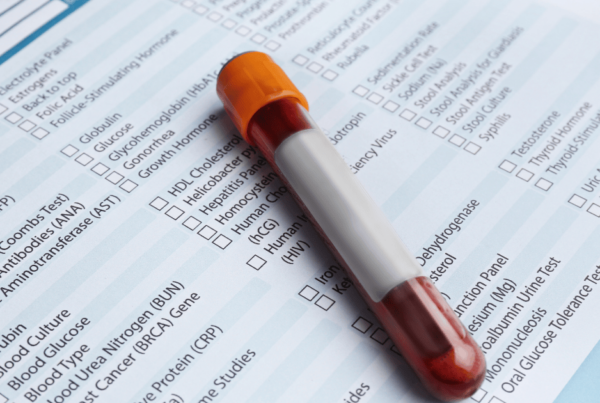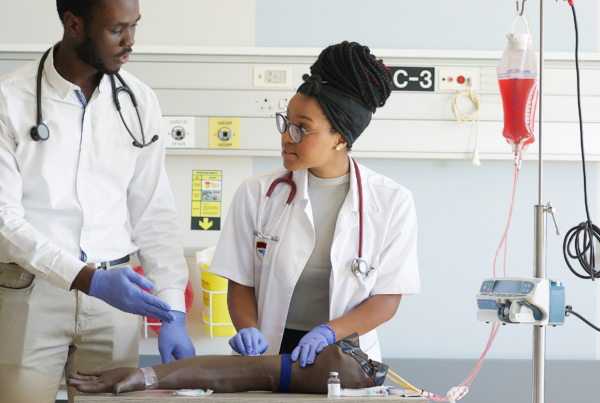Blood tests are a vital part of modern healthcare, providing essential information about your health. Whether you’re monitoring a chronic condition, diagnosing a new issue, or simply having a routine check-up, proper preparation can ensure accurate results. This guide will walk you through how to prepare for a blood test, offering tips and insights to make the process as smooth as possible.
| Key Takeaways: How to Prepare for a Blood Test |
| Follow Instructions: Always follow your doctor’s specific instructions regarding fasting, medications, and other preparations. |
| Stay Hydrated: Drinking water before your test can make the blood draw easier. |
| Avoid Certain Substances: Refrain from alcohol and caffeine for at least 24 hours before your test. |
| Be Prepared: Bring necessary documents, wear appropriate clothing, and arrive early to your appointment. |
| Manage Anxiety: Use relaxation techniques and communicate with the technician to ease any nervousness. |
Why Preparation Matters
Preparing for a blood test is crucial for obtaining accurate results. Factors such as food, drink, and physical activity can influence the levels of various substances in your blood. By following your doctor’s instructions and preparing properly, you can help ensure that your test results are reliable.
Preparation Strategies for the Day Before Your Blood Test
Follow Your Doctor’s Instructions
The most important step in preparing for a blood test is to follow your doctor’s instructions. Depending on the kind of test, you may have to:
- Fast for 8-12 Hours: Some tests, like glucose tests or lipid profiles, require fasting. During this period, you should not eat or drink anything except water.
- Avoid Certain Medications: Your doctor might ask you to stop taking certain medications that could affect your test results.
General Tips for All Patients
- Avoid Alcohol and Caffeine: These substances can impact your test results. It’s best to avoid them for at least 24 hours before your test.
- Stay Hydrated: Drink plenty of water the day before and the day of your test. Hydration makes your veins more accessible and the blood draw easier.
- Get Plenty of Sleep: Being well-rested can help your body function optimally and reduce stress.
Blood Tests That Typically Require Fasting
Your doctor will inform you if fasting is necessary for your blood test. Common tests that require fasting include:
- Liver function tests
- Cholesterol tests (lipid panels)
- Triglyceride level tests
- Blood glucose tests
- Tests for high- and low-density lipoproteins (LDL and HDL)
- Metabolic panel tests
Preparation Tips for the Day of Your Blood Test
Stay Hydrated
On the day of your test, continue to drink water. The secret to a successful blood draw is hydration.
Avoid Caffeinated Drinks
Caffeine can dehydrate you, making it harder for the technician to draw blood. Stick to water until after your test.
Eat a Light Meal (If Not Fasting)
If your test does not require fasting, have a light meal about 1-2 hours before your appointment. This may lessen the chance of dizziness during the blood extraction.
Dress Comfortably
Wear short sleeves or clothes with sleeves that can be easily rolled up. This makes it easier for the technician to access your arm.
Arrive Early
Arrive a few minutes early to complete any necessary paperwork and to reduce any last-minute stress.
Bring Necessary Items
Bring your insurance card, identification, and a small snack for after your appointment.
What to Expect During a Blood Draw Procedure
A blood draw is a quick and typically painless procedure. Here’s what you can expect:
- Check-In: Upon arrival, you’ll check in at the front desk and wait until you’re called.
- Preparation: The technician will ask you to sit in a chair with an armrest. You’ll need to roll up your sleeve past your elbow.
- Cleaning: Your arm will have a tiny area cleaned by the technician using an antiseptic wipe.
- Tourniquet Application: An elastic band will be tied around your upper arm to make your vein more prominent.
- Blood Draw: The technician will insert a needle into your vein. Although it could prickle you a little, it shouldn’t hurt.
- Bandaging: Once enough blood has been drawn, the technician will remove the needle and place a small bandage over the puncture site.
After the Blood Draw
Immediate Post-Procedure Care
- Apply Pressure: Apply pressure to the puncture site to prevent bruising.
- Hydrate and Snack: Drink water and have a small snack if you were fasting.Your blood sugar levels may stabilize as a result of this.
Monitor the Puncture Site
- Watch for Bruising: Minor bruising is common and should fade within a few days.
- Check for Infection: If you notice redness, swelling, or prolonged pain, contact your healthcare provider.
Coping with Nervousness
If you feel nervous about the blood draw, here are some tips to help you cope:
- Communicate: Inform the technician if you’re feeling anxious. They can provide extra support.
- Distraction: Focus on an object in the room, listen to music, or chat with the technician to take your mind off the procedure.
- Relaxation Techniques: Practice deep breathing or mindfulness exercises to stay calm.
- Support: Bring a friend or family member for moral support.
How Long Does It Take to See the Results?
The time it takes to receive your blood test results can vary:
- Common Tests: Results for tests like complete blood count, basic metabolic panel, and lipid panel are usually available within 24 hours to a few days.
- Specialized Tests: Tests for rare conditions might take longer, sometimes up to a few weeks.
Speak with your doctor or laboratory technician to understand when you can expect your results.
Frequently Asked Questions
Is it okay to drink water before a fasting blood test?
Yes, drinking water is encouraged as it helps keep you hydrated and makes the blood draw easier.
What happens if I forget to fast before my blood test?
Inform the technician or your doctor. Depending on the test, they may need to reschedule your appointment.
How Long Will the Blood Draw Take?
The blood draw technique typically takes only a few minutes.
Can I Take My Typical Prescription Drugs Right Before a Blood Test?
Follow your doctor’s instructions. Some medications may need to be paused, while others can be taken as usual.
What Should I Do If I Feel Faint During the Blood Draw?
Inform the technician immediately. They can help you lie down and provide support until you feel better.
How Can I Reduce Bruising After a Blood Draw?
Apply pressure to the puncture site immediately after the needle is removed and keep the area clean and covered with a bandage.
Additional Preparation Tips
Plan Your Day Around the Blood Test
If you need to fast, schedule your blood test early in the morning. This way, you can fast overnight while you sleep and have the test done soon after you wake up. This minimizes the time you have to go without food and drink.
Know the Location
Make sure you know where the lab or clinic is located and how long it will take you to get there. Consider traffic and parking so you can arrive on time without feeling rushed.
Inform Your Technician of Any Concerns
If you have a history of fainting or have had difficult blood draws in the past, let the technician know. They can take extra precautions to make you comfortable.
Bring a Distraction
If you get nervous, bring something to distract you during the blood draw, such as a book, music, or a stress ball.This will assist divert your attention from the process.
Practice Relaxation Techniques
Deep breathing exercises, visualization, or other relaxation techniques can help you stay calm. Practice these techniques in the days leading up to your appointment so you can use them effectively during the blood draw.
Understand the Purpose of the Test
Knowing why you’re having a blood test and what it will check can make the process feel more meaningful and less stressful. Ask your doctor to explain the purpose of the test and how the results will help manage your health.
Understanding Blood Tests
What Blood Tests Measure
Blood tests can measure a wide range of substances and cells in your blood, including:
- Glucose Levels: To monitor for diabetes.
- Cholesterol Levels: To assess heart disease risk.
- Electrolytes and Minerals: To check kidney function and overall health.
- Red and White Blood Cells: To diagnose conditions like anemia and infections.
- Hormone Levels: To evaluate thyroid function and other endocrine issues.
Types of Blood Tests
- Complete Blood Count (CBC):Measures your blood’s different components, such as its platelets, white blood cells, and red blood cells.
- Basic Metabolic Panel (BMP): Checks levels of glucose, calcium, and electrolytes.
- Lipid Panel: Measures cholesterol and triglycerides.
- Liver Function Tests: Assess the health of your liver.
- Thyroid Function Tests: Evaluate thyroid gland activity.
Special Considerations for Different Populations
Children
Preparing children for a blood test can be challenging. Explain the process in simple terms and reassure them that it will be quick. Bringing a favorite toy or comfort item can help ease their anxiety.
Elderly Patients
Elderly patients may have more fragile veins, making blood draws more difficult. Ensuring they are well-hydrated can help. It’s also important to be patient and gentle, as they may bruise more easily.
Patients with Chronic Conditions
If you have a chronic condition that requires regular blood tests, you may be more familiar with the process. However, always follow your doctor’s specific instructions, as your condition might necessitate special preparations.
Pregnant Women
Pregnant women may need blood tests to monitor their health and the health of their baby. It’s essential to follow any fasting or medication guidelines provided by your healthcare provider.
Final Thoughts
Preparing for a blood test is a simple yet essential step in ensuring accurate results and a smooth procedure. By following these guidelines and staying informed, you can make the experience as stress-free as possible. Remember, your healthcare team is there to support you, so don’t hesitate to ask questions or express any concerns you may have.
For more tips and health-related information, visit Phlebotomy Now School’s blog. We are dedicated to providing high-quality education and resources for patients and healthcare professionals alike.


